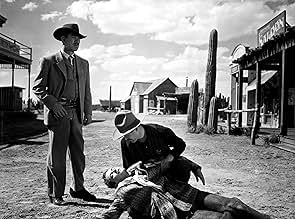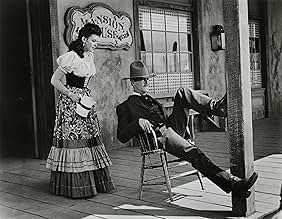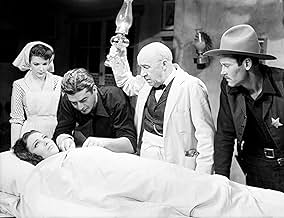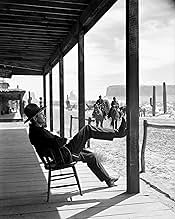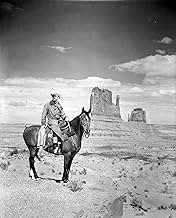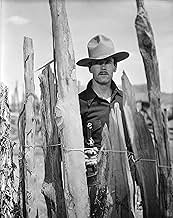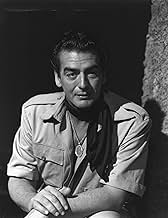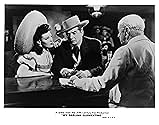CALIFICACIÓN DE IMDb
7.7/10
27 k
TU CALIFICACIÓN
Los Earp se enfrentan a los Clanton en Tombstone, Arizona.Los Earp se enfrentan a los Clanton en Tombstone, Arizona.Los Earp se enfrentan a los Clanton en Tombstone, Arizona.
- Dirección
- Guionistas
- Elenco
- Premios
- 3 premios ganados en total
Robert Adler
- Stagecoach Driver
- (sin créditos)
C.E. Anderson
- Townsman
- (sin créditos)
Don Barclay
- Opera House Owner
- (sin créditos)
Hank Bell
- Opera House Patron
- (sin créditos)
Opiniones destacadas
John Ford's exquisite film about marshall of Tombstone, Wyatt Earp and Doc Holliday and their incredible gunfight against the Clantons at the O.K.Corral. Dramatic and wonderfully brooding, Ford employs it all here; perfect lighting, superb photography and as always, a fabulous and unmatched use of the camera. Many other films have been made on this subject, but you need look no further than this cinematic masterpiece.
It's 1882. Wyatt Earp (Henry Fonda) and his brothers are driving cattle to California when they encounter Old Man Clanton who tries to buy their cattle with a low-ball offer. Wyatt kindly rejects the offer. The Earps stop at Tombstone to find a lawless town. Their cattle gets stolen and Wyatt's youngest brother James is murdered by unknown assailants. Wyatt suspects the Clantons and takes the job of town marshal. Volatile gambler Doc Holliday (Victor Mature) returns to town. Doc's past Clementine Carter (Cathy Downs) tracks him down all the way from Boston despite his refusal for her help. Doc's present day friend Chihuahua (Linda Darnell) is not happy with her presence.
I really love the start and Henry Fonda can do no wrong especially as a stoic heroic lead. I have a bit of an issue with Victor Mature. I can't forget Val Kilmer playing the role who is so much more fun. Mature is more angry than sickly. As for the iconic shootout, again I really love the start. Monument Valley looks epic in the background. I love the slow walk up to the OK Corral. Then the action isn't quite as epic. Director John Ford would say that he extended it from a 30 seconds fight but it doesn't really measure up to modern action scenes. All in all, this is a classic for its time.
I really love the start and Henry Fonda can do no wrong especially as a stoic heroic lead. I have a bit of an issue with Victor Mature. I can't forget Val Kilmer playing the role who is so much more fun. Mature is more angry than sickly. As for the iconic shootout, again I really love the start. Monument Valley looks epic in the background. I love the slow walk up to the OK Corral. Then the action isn't quite as epic. Director John Ford would say that he extended it from a 30 seconds fight but it doesn't really measure up to modern action scenes. All in all, this is a classic for its time.
MY DARLING CLEMENTINE ( rating, * * * * ½ out of 5 )
Adapted from the book 'Wyatt Earp, Frontier Marshal' by Stuart N. Lake, writers Samuel G. Engel, Winston Miller and Sam Hellman, and the great director himself John Ford, offer this most atmospheric depiction of Wyatt Earp, Doc Holliday and the most famous of shootouts in Western folk-lore.
The story basically covers the period when Wyatt Earp cleaned up Tombstone and wiped out the Clanton gang at the OK Coral. This is time-honored stuff. Nostalgic dramatizations that romanticized the Wild West while creating unforgettable heroes and notorious villains.
John Ford's handling of this motion picture is done with great care and obvious affection. Significant endeavor and attention to detail has gone into the period's reconstruction and the result is what can only be described as lyrical. A synchronous composition of sight and sound that produces a mesmerizing effect which in turn forces any viewer to fall instantly in love with this film.
Henry Fonda's portrayal of Wyatt Earp is without doubt the best that has ever been attempted and Victor Mature's Doc Holliday has him in rare form. Add cast members Walter Brennan, Linda Darnell, Ward Bond and John Ireland, and this film just crackles along.
There is one interesting irony I have noted. In John Ford's celebrated history as a director, particularly in the days when he was making silent films, the real Wyatt Earp acted as Ford's technical adviser bringing a new level of authenticity to gun play that Hollywood in the past had only guessed at. But in 'My Darling Clementine', the final shootout although well done, has a fantasy-like quality about it that avoids a sense of violent realism and adopts a surreal quality - as if seen through a dream.
Because John Ford knew all too well how to make a gunfight look believable, maybe this film allowed him to go beyond what was expected and to produce something a little special, and maybe it was shot in the way that Wyatt Earp wished it could have really happened. To successfully bend the rules, it really helps to have written them in the first place.
'My Darling Clementine' is a joy to behold. Sure, there are a few moments when minor cracks appear, but for pure entertainment value, it is unsurpassed. This movie is what going to the pictures on a Saturday afternoon was all about - those delightful matinee sessions when you'd load your arms up with confectionery, scramble for the best seats in the back row and experience the escapism that made growing up in the suburbs almost tolerable.
Adapted from the book 'Wyatt Earp, Frontier Marshal' by Stuart N. Lake, writers Samuel G. Engel, Winston Miller and Sam Hellman, and the great director himself John Ford, offer this most atmospheric depiction of Wyatt Earp, Doc Holliday and the most famous of shootouts in Western folk-lore.
The story basically covers the period when Wyatt Earp cleaned up Tombstone and wiped out the Clanton gang at the OK Coral. This is time-honored stuff. Nostalgic dramatizations that romanticized the Wild West while creating unforgettable heroes and notorious villains.
John Ford's handling of this motion picture is done with great care and obvious affection. Significant endeavor and attention to detail has gone into the period's reconstruction and the result is what can only be described as lyrical. A synchronous composition of sight and sound that produces a mesmerizing effect which in turn forces any viewer to fall instantly in love with this film.
Henry Fonda's portrayal of Wyatt Earp is without doubt the best that has ever been attempted and Victor Mature's Doc Holliday has him in rare form. Add cast members Walter Brennan, Linda Darnell, Ward Bond and John Ireland, and this film just crackles along.
There is one interesting irony I have noted. In John Ford's celebrated history as a director, particularly in the days when he was making silent films, the real Wyatt Earp acted as Ford's technical adviser bringing a new level of authenticity to gun play that Hollywood in the past had only guessed at. But in 'My Darling Clementine', the final shootout although well done, has a fantasy-like quality about it that avoids a sense of violent realism and adopts a surreal quality - as if seen through a dream.
Because John Ford knew all too well how to make a gunfight look believable, maybe this film allowed him to go beyond what was expected and to produce something a little special, and maybe it was shot in the way that Wyatt Earp wished it could have really happened. To successfully bend the rules, it really helps to have written them in the first place.
'My Darling Clementine' is a joy to behold. Sure, there are a few moments when minor cracks appear, but for pure entertainment value, it is unsurpassed. This movie is what going to the pictures on a Saturday afternoon was all about - those delightful matinee sessions when you'd load your arms up with confectionery, scramble for the best seats in the back row and experience the escapism that made growing up in the suburbs almost tolerable.
Director John Ford takes extensive liberties with the facts in this version of the events that led to the infamous 'gunfight at the OK corral'. This is evident from the opening scenes, in which Tombstone is seen nestled amongst the unmistakable buttes of Monument Valley (which is 500 miles north of the actual town) and young James Earp is murdered (he actually died 35 years later of natural causes), to the final scenes, the shooting of a character who in fact died several months before the gunfight. Despite these, and other glaring inaccuracies, the film is a well-acted and entertaining A-list western. Fonda is as good as always as Wyatt Earp, as is the usually avuncular Walter Brennen as the murderous "Old Man" Clanton, but I didn't find Victor Mature to make a particularly convincing 'Doc' Holiday. The rest of the cast, which includes a lot of well-known character actors and some of Ford's usual players (such as Ward Bond (who plays Morgan Earp), Jane Darnell and Russel Simpson), are fine. The main story of the mounting hostility between the Earps and the Clantons is great but I didn't find the secondary story, a love triangle involving Doc Holiday (who was a dentist, not a surgeon), the titular Clementine (a bland Cathy Downs), and saloon singer Chihuahua (a clichéd Linda Darnell) to be very interesting. Although apparently not the easiest person to work for, Ford was an excellent filmmaker: the black and white desert cinematography is striking and the climactic gun-fight is dramatic and realistic (as movie gunfights go). While I would not rank "My Darling Clementine" amongst the director's best oaters (such as Stagecoach (1939), the cavalry trilogy (1948-50), or The Searchers (1956)), it is a fine western (but not much of a history lesson).
If you're looking for a straight-forward, fairly factual presentation of the events leading up to the 'Gunfight at the O.K. Corral', watch 'Wyatt Earp', or 'Tombstone'...But if you prefer your history more spiritual, and want to see a master storyteller paint a visual canvas of a West that may never have existed, but SHOULD have, then this film should be a treasured part of your video collection!
John Ford knew Wyatt Earp personally, and was familiar with the events surrounding the Tombstone shootout, but one of his greatest assets as a director was his ability to look beyond simple facts, and focus on what 'made' a legend. 'My Darling Clementine' is a story of icons, of Loners, accepting their own weaknesses and limitations, yet willing to risk their lives and abilities to aid others, then to walk away, allowing Civilization to grow. It's a classic theme of most great westerns, particularly in Ford's work (he would return to it in 'The Searchers', and 'The Man Who Shot Liberty Valance'), as well as other directors ('Shane', 'A Fistful of Dollars', 'Unforgiven', and 'Open Range' are a few examples).
Wyatt Earp (wonderfully portrayed by Henry Fonda) and his brothers have an aloofness that makes their characters both deceptively simple, yet enigmatic at the same time. At the film's start, Wyatt's a cowpuncher who had walked away from the responsibilities of being a lawman, finding satisfaction with his brothers in the hard work and solitary life of the range. When the Clantons (led by Walter Brennan, in one of his greatest, yet most vicious roles), first approach the brothers on the range, they accept the old man's invitation to get a taste of city life, but it's clear that it will only be a brief stay before they move on, and Wyatt brushes aside any overtures of friendship.
Wyatt's lack of desire to commit to a larger community is stressed when he subdues an armed, drunken Indian with his bare hands in a saloon (based on an actual event in Earp's life), then turns down the city council's plea to accept the Marshall's badge. Only after a brother is murdered do the Earp brothers decide to clean up the town, as it had become 'personal'.
In counterpoint to Earp is another 'loner', Doc Holliday (sensitively portrayed by Victor Mature), an intellectual who fled the South, and had found his solitude through his guns, his gambling, and his illness. While Wyatt is a true 'Man of the West', however, Holliday is simply a lonely man with no place to go, only comfortable at a poker table. He is doomed, more by his own shrinking world, than by the disease that forces him to cough into his handkerchief.
The scenes of Wyatt in Tombstone are wonderful, as Civilization grows up around the uncomfortable stranger. Yet he toys with the idea of settling into this world, through his polite yet obvious attraction to Doc's lost love, Clementine. The scene of the outdoor church dance, where the stiffly formal Earp dances against the vista of a West being 'boarded in' is symbolic of what his own life, and the West, itself, was becoming, and is classic Ford!
The climactic shootout at the O.K. Corral is both powerful and raw, ultimately fulfilling the Earps' commitment to a world that needed their aid, and ending the downward spiral of Holliday's life, in a heroic and theatrical gesture.
It's often asked why Wyatt leaves, afterward, when Clementine and Tombstone are so attractive...The answer is simple, really; his work is finished, and his participation was no longer necessary. Civilization could now grow, unimpeded. The Loner would have no place there. Like Ethan, or Shane, or 'The Man With No Name', he must return to the solitary vistas that are his true home.
John Ford has truly created the 'Stuff of Legends' with this beloved classic!
John Ford knew Wyatt Earp personally, and was familiar with the events surrounding the Tombstone shootout, but one of his greatest assets as a director was his ability to look beyond simple facts, and focus on what 'made' a legend. 'My Darling Clementine' is a story of icons, of Loners, accepting their own weaknesses and limitations, yet willing to risk their lives and abilities to aid others, then to walk away, allowing Civilization to grow. It's a classic theme of most great westerns, particularly in Ford's work (he would return to it in 'The Searchers', and 'The Man Who Shot Liberty Valance'), as well as other directors ('Shane', 'A Fistful of Dollars', 'Unforgiven', and 'Open Range' are a few examples).
Wyatt Earp (wonderfully portrayed by Henry Fonda) and his brothers have an aloofness that makes their characters both deceptively simple, yet enigmatic at the same time. At the film's start, Wyatt's a cowpuncher who had walked away from the responsibilities of being a lawman, finding satisfaction with his brothers in the hard work and solitary life of the range. When the Clantons (led by Walter Brennan, in one of his greatest, yet most vicious roles), first approach the brothers on the range, they accept the old man's invitation to get a taste of city life, but it's clear that it will only be a brief stay before they move on, and Wyatt brushes aside any overtures of friendship.
Wyatt's lack of desire to commit to a larger community is stressed when he subdues an armed, drunken Indian with his bare hands in a saloon (based on an actual event in Earp's life), then turns down the city council's plea to accept the Marshall's badge. Only after a brother is murdered do the Earp brothers decide to clean up the town, as it had become 'personal'.
In counterpoint to Earp is another 'loner', Doc Holliday (sensitively portrayed by Victor Mature), an intellectual who fled the South, and had found his solitude through his guns, his gambling, and his illness. While Wyatt is a true 'Man of the West', however, Holliday is simply a lonely man with no place to go, only comfortable at a poker table. He is doomed, more by his own shrinking world, than by the disease that forces him to cough into his handkerchief.
The scenes of Wyatt in Tombstone are wonderful, as Civilization grows up around the uncomfortable stranger. Yet he toys with the idea of settling into this world, through his polite yet obvious attraction to Doc's lost love, Clementine. The scene of the outdoor church dance, where the stiffly formal Earp dances against the vista of a West being 'boarded in' is symbolic of what his own life, and the West, itself, was becoming, and is classic Ford!
The climactic shootout at the O.K. Corral is both powerful and raw, ultimately fulfilling the Earps' commitment to a world that needed their aid, and ending the downward spiral of Holliday's life, in a heroic and theatrical gesture.
It's often asked why Wyatt leaves, afterward, when Clementine and Tombstone are so attractive...The answer is simple, really; his work is finished, and his participation was no longer necessary. Civilization could now grow, unimpeded. The Loner would have no place there. Like Ethan, or Shane, or 'The Man With No Name', he must return to the solitary vistas that are his true home.
John Ford has truly created the 'Stuff of Legends' with this beloved classic!
¿Sabías que…?
- TriviaJohn Ford was asked by a film historian why he changed the historical details of the famous gunfight if, as he claimed, the real Wyatt Earp had told him all about it on a movie set back in the 1920s. "Did you like the film?" Ford asked, to which the scholar replied it was one of his favorites. "What more do you want?" Ford snapped.
- ErroresThe movie shows James Earp killed (murdered) with his marker showing "born 1864 died 1882". However, James Earp was, in fact, born in 1841 and died in 1926 of natural causes. It was Morgan Earp who was murdered on 18 March 1882.
- Citas
Wyatt Earp: Mac, you ever been in love?
Mac: No, I've been a bartender all me life.
- Créditos curiososThe opening credits appear to be etched into nine wooden boards (like signs) nailed to a post. The camera pans down as the post rotates 90 degrees back and forth for each board.
- Versiones alternativasIn 1994, an alternate "preview" version of the film was found that runs 103 or 104 minutes, according to different sources. In June 1946, director John Ford showed producer Darryl F. Zanuck his cut of the film. Zanuck's opinion was that the film had some problems, so Zanuck reshot certain scenes with Director Lloyd Bacon. Zanuck also recut other scenes, changed the music at certain points, and slightly altered the finale. In all, 35 minutes of footage was shot or recut, and the film was released at 97 minutes. Both the 103-104 min. archival preview print and the 97 min. release print are on the Fox DVD released January 6, 2004.
- ConexionesEdited into John Ford, l'homme qui inventa l'Amérique (2019)
- Bandas sonoras(Oh My Darlin') Clementine
(1884) (uncredited)
Music by Percy Montrose
Lyrics by H.S. Thompson
Played and Sung during the opening credits and at the end
Also Whistled by Henry Fonda entering the hotel lobby on Sunday morning; stops whistling when he sees Clementine
Selecciones populares
Inicia sesión para calificar y agrega a la lista de videos para obtener recomendaciones personalizadas
- How long is My Darling Clementine?Con tecnología de Alexa
Detalles
Taquilla
- Presupuesto
- USD 2,000,000 (estimado)
- Total a nivel mundial
- USD 16,432
- Tiempo de ejecución1 hora 37 minutos
- Color
- Relación de aspecto
- 1.37 : 1
Contribuir a esta página
Sugiere una edición o agrega el contenido que falta

Principales brechas de datos
By what name was La pasión de los fuertes (1946) officially released in India in Hindi?
Responda

